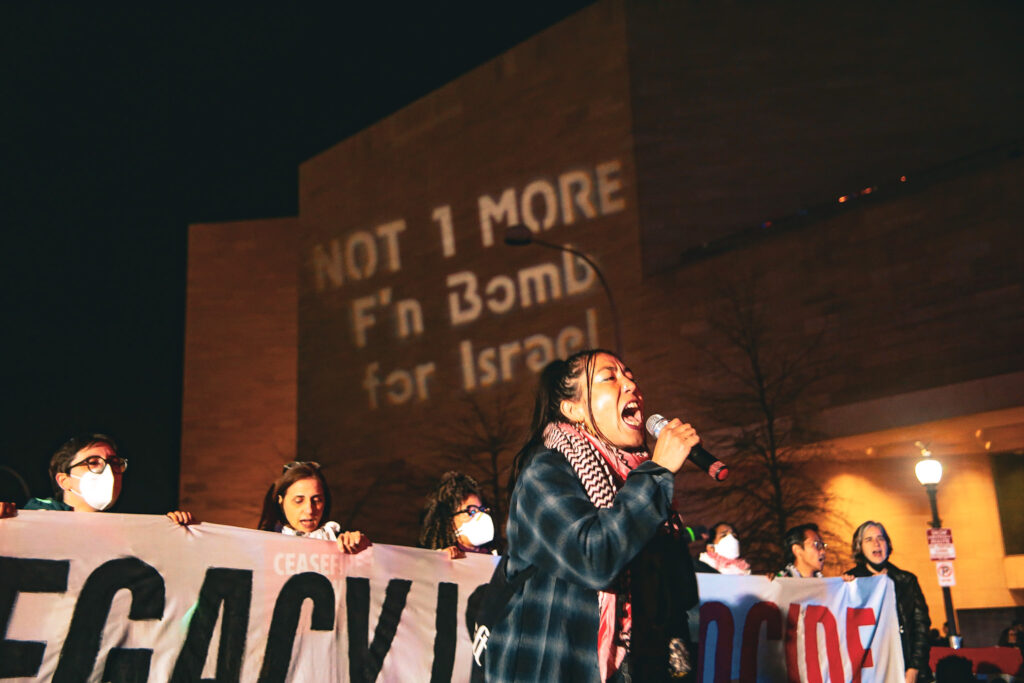
Educational and cultural institutions have granted prestigious positions to weapons manufacturers’ executives and directors, entrusting them with tremendous influence over how institutions respond—or don’t respond—to the destruction of life across our planet.
Undergirding institutional decisions on how to respond to the genocide in Gaza is a power structure made up of weapons company executives and board members.
On this site, we present a preliminary dataset and analysis to highlight key members of what we call “the genocide gentry.” Our research demonstrates the wide reach and influence that the weapons industry has on our cultural and educational institutions.
Our hope is that, with this data, the Palestine solidarity movement can find more opportunities to leverage our collective power to chip away at the influence of the genocide gentry.


Methodology:
We chose to look at institutional connections to weapons manufacturers, because weapons manufacturers have the most to gain from war.
By building and providing the very guns, bombs, and fighter jets that have been used to kill over 40,000 Palestinians in Gaza, these weapons manufacturers are raking in profits and lucrative contracts at the expense of the destruction of Palestinian life & culture.
This dataset looks at the current CEOs and board members of 6 major weapons companies and maps out their connections to cultural and higher education institutions. Because the U.S. is the largest arms supplier to Israel, we chose to focus on the top five US-based Department of Defense contractors by revenue who supply weapons and military equipment to Israel. We also chose to include the US-based wing of Elbit Systems, as Elbit is Israel’s largest arms manufacturer:
- Lockheed Martin: F-16 and F-35 fighter jets, CH-53k helicopters, C-130J aircraft
- RTX (formerly known as Raytheon): missiles and equipment for Israel’s Iron Dome Weapons System and David’s Sling System
- Boeing: KC-46A tankers, F-15 fighter jets, AH-64 Apache attack helicopter, bombs and bomb kits, Joint Direct Attack Munitions (JDAMs)
- Northrop Grumman: plays a “significant” role in producing Lockheed’s F-35 fighter jets
- Elbit Systems of America: howitzer systems are in production and mortar artillery systems have been used by the IOF
- General Dynamics: MK-80 bomb series
To determine these connections, we reviewed the list of current board members on each weapons company’s website.

We started by looking at connections to cultural and educational institutions and affiliations mentioned in the short biographies on each company’s website. We then engaged in targeted web searches on each person to determine current employer and position, as well as any other current or former affiliations with institutions in the culture industries. We collected this data between February 2024 and August 2024 and therefore, it represents a snapshot in time. It’s possible that board memberships, as well as affiliations, have changed since then.
These individuals and institutions – our modern-day gentry – may deny that Israel is engaged in genocide, despite ample evidence to the contrary. And they may also fail to recognize their own role in facilitating that genocide. Still, the fact remains that they are part of a privileged class that profits from the weapons sales that support this devastating war, and their influence spreads far throughout the cultural and academic spheres. When they give voice and cultural respectability to arms dealers, they are themselves enabling mass destruction.
Many board members of weapons companies also have significant ties to other neoliberal institutions and extractive industries such as fossil fuel corporations, think tanks, and philanthropy. We make particular note of individuals in this dataset who hold ties to fossil fuel corporations as a way to highlight that Palestinian liberation and climate justice are linked struggles, often having in common corporations fueling the ongoing genocide in Gaza as well as the broader climate crisis.
We hope our research will inspire others to uncover further connections between weapons manufacturers’ executives and directors and prominent cultural and educational institutions in your cities and states.
Key Findings:
- We found 54 museums, cultural organizations, universities and colleges that currently host these individuals on their boards or in other prominent roles.
- Many of the board members of weapons companies also have significant ties to the fossil fuel industry, neoliberal think tanks, and philanthropy.
